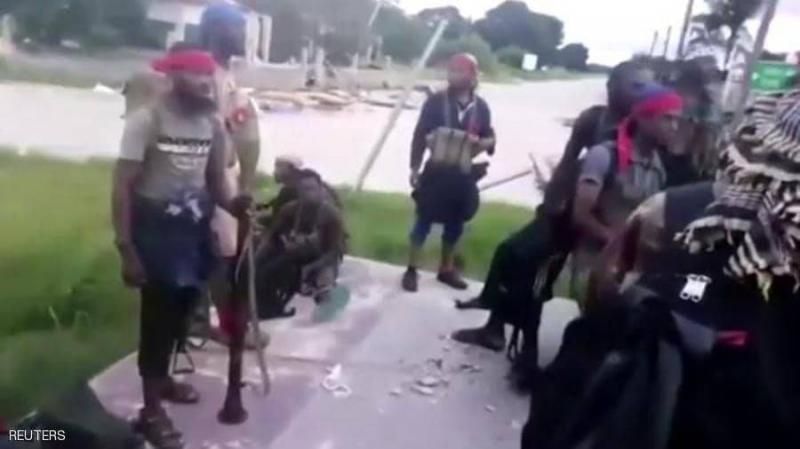Two years ago, the United States announced the death of ISIS leader Abu Bakr al-Baghdadi after security victories over the organization and its expulsion from controlled areas in Syria and Iraq, which some considered a sort of end for the group. However, the organization has repositioned itself in other regions in Africa, where it has taken control of cities, allied with smaller extremist groups, and absorbed them while defeating other extremist factions.
From Syria and Iraq to Europe, Africa, and other countries around the world, the terrorist organization's cells have awakened, executing dozens of attacks through lone wolves that have resulted in casualties among civilians and security forces. At the end of October 2019, the United States announced the killing of Ibrahim Awad al-Samarrai, known as "Abu Bakr al-Baghdadi," following a nighttime raid on his residence in Syria which also led to the deaths of some of his companions.
Repeatedly, Washington has affirmed that "ISIS still represents a significant threat, and it is important to continue the sustained pressure on its remnants in Iraq and Syria and to bolster collective efforts to defeat its branches and networks worldwide, which have garnered increasing attention since the collapse of its so-called caliphate."
### Escalating Operations
The pace of terrorist operations by remnants of ISIS and its sleeper cells has notably increased in various parts of the world over the past few months. On Tuesday, ISIS committed a horrific massacre in the village of Al-Rashad in the Muqdadiyah district in eastern Iraq, resulting in 40 casualties among unarmed civilians. Uganda also witnessed two bombings within 24 hours, preceded by a third blast earlier this month, two of which were claimed by ISIS, while the authorities blamed a related group for the third. Additionally, the stabbing murder of British MP David Amess in mid-October was conducted by an individual who identified himself as a member of ISIS. Last Tuesday, the US Department of Defense (Pentagon) warned that ISIS in Afghanistan could become capable of executing attacks outside the country within a period of 6 to 12 months.
### Repositioning in Africa
Since ISIS lost its presence and its dreams of establishing its so-called state in Iraq and Syria faded, the continent of Africa has attracted the organization's members fleeing from Iraq, Syria, and Libya, thus bolstering its strength especially in West and East Africa. According to several research centers specialized in tracking the activities of terrorist groups, ISIS in the Sahel and West Africa has entered a phase of restructuring its operations in the region.
After taking control of most parts of Borno State in northeastern Nigeria, including areas around Lake Chad, and completing the arc with its strongholds in the Sahara, ISIS is seeking to reunite this vast area and divide it into provinces. In March, ISIS announced its control over the coastal city of Palma in northern Mozambique, paving the way for replicating its experience in Raqqa and Mosul, but this time in Africa.
### ISIS Has Not Ended
Iraqi academic, Muthana al-Obaidi, stated that the security developments and terrorist activities carried out by ISIS members, particularly in Iraq, indicate that the organization has not completely ended following the liberation of the territories and areas it controlled since June 2014. Al-Obaidi mentioned in statements to "Sky News Arabia" that there are hidden cells in several uninhabited and desert areas, especially in the west of the country and near the Iraqi-Syrian border.
He clarified that under the current circumstances, it is unlikely for the organization to control populated areas as it did previously in Iraq, due to societal rejection and its economic, military, and human losses in the country. He continued, "In Africa, however, conditions are favorable for the spread of the organization's cells in several countries on the continent."
### Continued Repositioning
Mustafa Zahra, a writer and researcher specializing in political Islamic movements, stated that the increase in military strikes against ISIS in Iraq and Syria has significantly heightened the organization's reliance on "lone wolves" to carry out terrorist operations both inside and outside the region to emphasize that it still exists and has not ended. Zahra added in statements to "Sky News Arabia" that ISIS relies on lone wolf operations as even highly competent security agencies cannot predict these attacks, posing a major challenge for them.
He explained that after losing Mosul and Raqqa, ISIS is repositioning itself and has shifted large concentrations to the heart of Africa, noting that the continent has been experiencing increased terrorism and competition between al-Qaeda and ISIS for over two years. He pointed out that by regularly following the media communications of ISIS, there are numerous announcements of targets in East and West Africa.
He considered that the fall of cities like coastal Palma in Cabo Delgado province in northern Mozambique will become a common occurrence likely to happen in various regions, stating: "The model of Raqqa and Mosul has become easy to replicate in Africa" due to several factors, primarily the fragile political reality of regimes facing numerous challenges and transformations, along with frequent military coups, as seen in Mali and elsewhere.
He emphasized that the deteriorating social conditions in central Africa create a fertile environment for the growth of extremism, and extremist organizations are aware of this, operating through the employment of these contexts to reposition themselves in other geographies.




